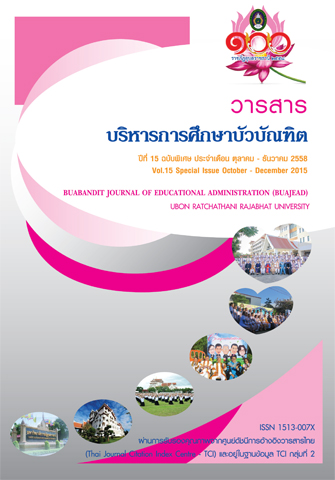การพัฒนาการจัดกิจกรรมแนะแนวโดยประยุกต์ใช้แนวคิดทฤษฎีคาลโรเจอร์ประกอบการใช้ สถานการณ์จำลองเพื่อส่งเสริมความฉลาดทางอารมณ์และการยอมรับนับถือตนเอง ของนักเรียนชั้นประถมศึกษาปีที่ 4
Main Article Content
บทคัดย่อ
การวิจัยครั้งนี้มีวัตถุประสงค์เพื่อ 1) พัฒนาการจัดกิจกรรมแนะแนวโดยประยุกต์ใช้แนวคิดทฤษฎี คาลโรเจอร์ประกอบการใช้สถานการณ์จำลอง สำหรับส่งเสริมความฉลาดทางอารมณ์และการยอมรับนับถือตนเอง ของนักเรียนชั้นประถมศึกษาปีที่ 4 2) ศึกษาประสิทธิภาพของการจัดกิจกรรมแนะแนวโดยประยุกต์ใช้แนวคิดทฤษฎี คาลโรเจอร์ประกอบการใช้สถานการณ์จำลอง ชั้นประถมศึกษาปีที่ 4 ตามเกณฑ์ 80/80 3) เปรียบเทียบความฉลาด ทางอารมณ์ของนักเรียนระหว่างก่อนและหลังการจัดกิจกรรมแนะแนว โดยประยุกต์ใช้แนวคิดทฤษฎีคาลโรเจอร์ ประกอบการใช้สถานการณ์จำลอง 4) เปรียบเทียบการยอมรับนับถือตนเองของนักเรียน ระหว่างก่อนและหลัง การจัดกิจกรรมแนะแนว กลุ่มผู้ให้ข้อมูลพื้นฐานการจัดกิจกรรมแนะแนว ได้แก่ ครูผู้สอนที่เกี่ยวข้อง จำนวน 2 คน นักเรียนชั้นประถมศึกษาปีที่ 4 จำนวน 40 คน กลุ่มตัวอย่าง ได้แก่ นักเรียนชั้นประถมศึกษาปีที่ 4 โรงเรียน อนุบาลร้อยเอ็ด จังหวัดร้อยเอ็ด ภาคเรียนที่ 2 ปีการศึกษา 2557 จำนวน 30 คน ได้มาโดยการสุ่มแบบกลุ่ม เครื่องมือที่ใช้ในการวิจัย ประกอบด้วย 1) แบบสอบถามปัญหา สภาพและความต้องการในการจัดกิจกรรมแนะแนว 2) แบบสัมภาษณ์ครู 3) แผนการจัดกิจกรรมแนะแนว จำนวน 8 แผน รวมเวลา 16 ชั่วโมง 4) แบบวัดความฉลาด ทางอารมณ์ จำนวน 30 ข้อ 5) แบบวัดการยอมรับ นับถือตนเอง จำนวน 25 ข้อ วิเคราะห์ข้อมูลโดยใช้ ร้อยละ ค่าเฉลี่ย ส่วนเบี่ยงเบนมาตรฐาน และทดสอบสมมติฐานด้วยสถิติ t-test (Dependent Samples)
ผลการวิจัยปรากฏดังนี้
1. ผลการพัฒนาการจัดกิจกรรมกรรมแนะแนว พบว่า ด้านข้อมูลพื้นฐานและสภาพปัญหา ของผู้เรียน ยังต้องการพัฒนาความฉลาดทางอารมณ์และการยอมรับนับถือตนเอง ในการจัดกิจกรรมแนะแนว เพิ่มขึ้น และผลการสังเคราะห์การจัดกิจกรรมแนะแนวโดยใช้แนวคิดทฤษฎีของคาลโรเจอร์ ประกอบสถานการณ์ จำลอง พบว่า การจัดกิจกรรมแนะแนวสำหรับนักเรียนชั้นประถมศึกษาปีที่ 4 ประกอบด้วยขั้น การจัดการเรียนรู้ 5 ขั้น ได้แก่ (1) ขั้นสร้างความสนใจให้กับผู้เรียน (2) ขั้นรับรู้เข้าใจกิจกรรมและบทบาทตามสถานการณ์ (3) ขั้นปฏิบัติ ตามบทบาทที่ออกแบบ (4) ขั้นสรุปและสะท้อนผลการปฏิบัติ (5) ขั้นวิเคราะห์และนำผลไปปรับใช้
ผลการประเมินคุณภาพและความเหมาะสมของแผนการจัดกิจกรรมแนะแนว มีค่าเฉลี่ย รายแผนตั้งแต่ 4.12-4.62 และโดยรวมเท่ากับ 4.29 ซึ่งมีคุณภาพและความเหมาะสมในระดับมาก
2. ผลการพัฒนาการจัดการเรียนรู้โดยใช้แนวคิดทฤษฎีของคาลโรเจอร์ประกอบการใช้สถานการณ์ จำลอง ชั้นประถมศึกษาปีที่ 4 มีประสิทธิภาพเท่ากับ 81.08/84.40 ซึ่งสูงกว่าเกณฑ์ที่กำหนด 80/80
3. ผลการเปรียบเทียบความฉลาดทางอารมณ์ของนักเรียน ก่อนเรียนและหลังเรียน พบว่า นักเรียน ที่ได้รับการจัดกิจกรรมแนะแนวโดยประยุกต์ใช้แนวคิดทฤษฎีคาลโรเจอร์ประกอบการใช้สถานการณ์จำลอง มีความฉลาดทางอารมณ์หลังเรียนสูงกว่าก่อนเรียน อย่างมีนัยสำคัญทางสถิติที่ระดับ .05
4. ผลการเปรียบเทียบการยอมรับนับถือตนเองของนักเรียน พบว่า นักเรียนที่ได้รับการจัดกิจกรรม แนะแนวโดยประยุกต์ใช้แนวคิดทฤษฎีคาลโรเจอร์ประกอบการใช้สถานการณ์จำลอง มีการยอมรับนับถือตนเอง หลังเรียนสูงกว่าก่อนเรียน อย่างมีนัยสำคัญทางสถิติที่ระดับ .05
Developing the Counseling Activity Applied with Carl Rogers Theory and Simulation Approach, to Enhance Emotional Intelligence and Self-Esteem for Prathomsuksa 4 Students
The purpose of this research were: 1) to develop counseling activity which were applied between Carl Rogers theory and simulation approach, to enhance emotional intelligence and self-esteem of Prathomsuksa 4 students, 2) to study the efficiency of counseling activity, which were applied between Carl Rogers theory and simulation approach, with the required establishment of 80/80, 3) to compare emotional intelligence of the students before and after learning with counseling activity, which were applied between Carl Rogers theory and simulation approach, 4) to compare self-esteem of the students before and after learning with counseling activity. The informants for giving preliminary information about the current state and problems of providing a counseling activities concerned with 2 teachers and 40 students Whereas, the samples for using counseling activity, which were applied between Carl Rogers theory and simulation approach, were 30 students of Roi-Et Kindergarten school, who obtained using cluster random sampling. The research instruments were comprised of : 1) questionnaire for the students about current state and problems in counseling activities, 2) interviewing form about providing of counseling activities for teachers, 3) plans for providing of counseling activities in Prathomsuksa 4 level with 8 plans, for 16 hours, 4) item scales for emotional intelligence with 30 items, 5) item scales for self-esteem with 30 items. The statistics used for analyzing data were percentage, mean, standard deviation, and t-test (Dependent samples) was employed for testing hypotheses.
The results of study were as follows :
1. The outcomes of developing counseling activity found that, for the Preliminary information and problems in providing activities to enhance emotional intelligence and selfesteem of students more better than the current state. For synthesizing of counseling activity process for Prathomsuksa 4 students was composed of 5 steps, those are: 1) Engagement with the students, 2) Perception and understanding in activities and roles in situations, 3) Performing of designed roles, 4) Concluding and reflecting of performing, and 5) Analyzing and adapting of productions. Whereas, the results of plans for counseling activity assessing for the quality and appropriateness were 4.12 -4.62 for each plan and for overall of plans was 4.29.
2. The results efficiency of counseling activity, which were applied between Carl Rogers theory and simulation approach, to enhance emotional intelligence and self-esteem of students, was 81.08/84.40, which was higher than the establishment criterion of 80/80.
3. The compare the emotional intelligence of students. Before and after learning that, the students showed higher emotional intelligence at the after than before providing counseling activity, which were applied Carl Rogers theory and simulation approach at the .05 level of significance.
4. The compare of Self-Esteem that, the students showed higher self-esteem at the after than before providing counseling activity, which were applied Carl Rogers theory and simulation approach at the .05 level of significance.

